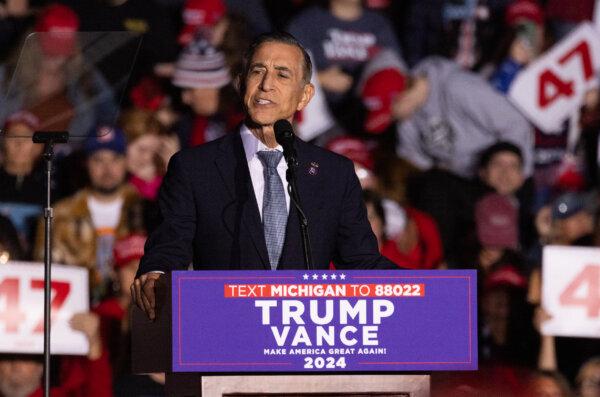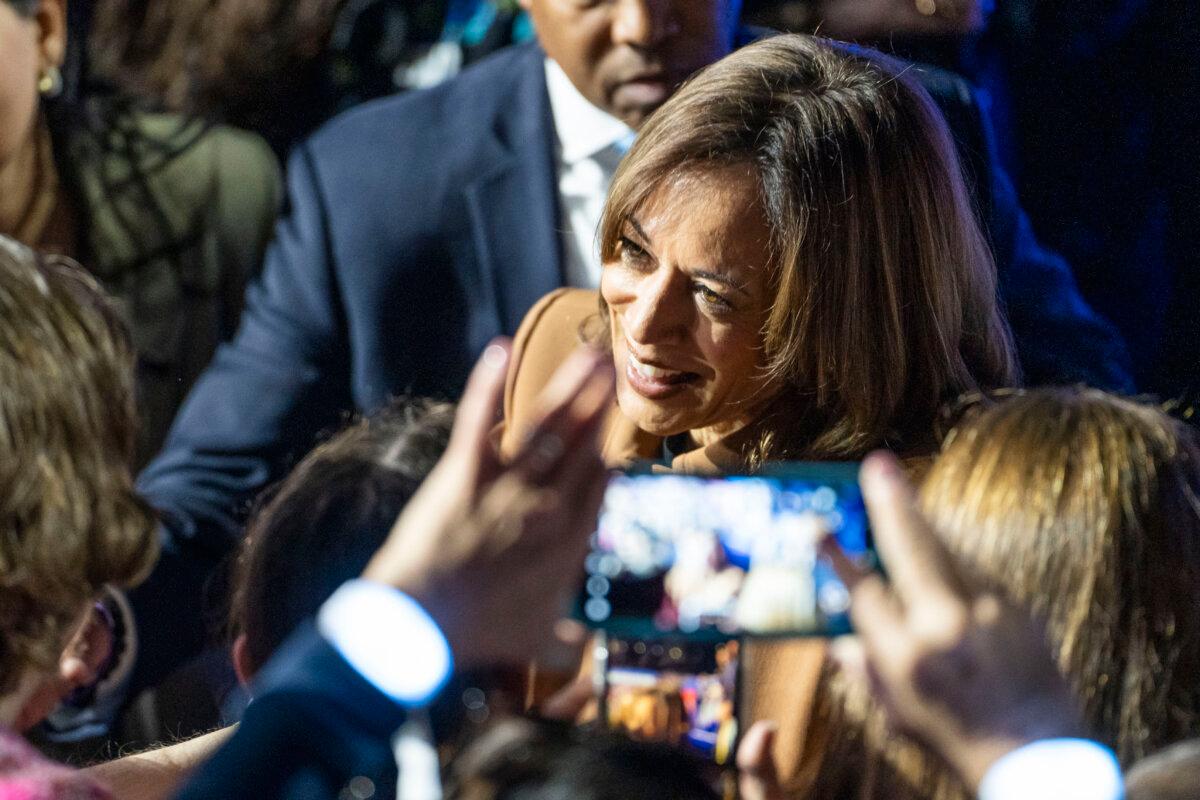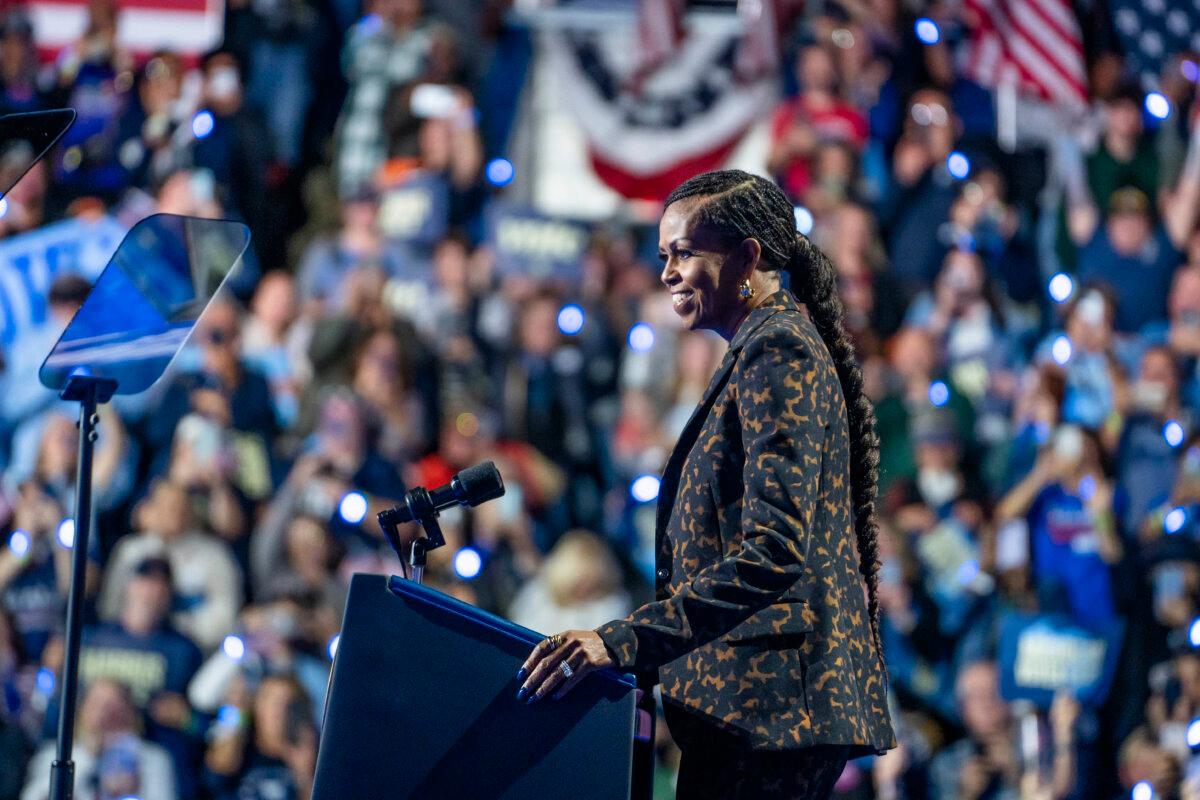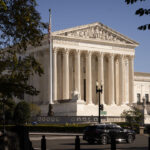Harris and Michelle Obama focused on narrowing the gender gap, while Trump targeted voters of Middle Eastern descent.
KALAMAZOO, Mich.—Vice President Kamala Harris and former President Donald Trump held consecutive rallies in Michigan, each appealing to distinct demographics on the first day of early voting in the state.
During her event in Kalamazoo on Oct. 26, Harris, alongside former First Lady Michelle Obama, aimed to reach out to men considering voting for a third-party candidate or abstaining from voting due to uncertainties about the Democratic nominee.
On the same day, Trump’s rally in Novi was geared towards Michiganders of Middle Eastern descent, particularly the Muslim community, which makes up a significant portion of the state’s population, mainly in the Detroit area.
Michigan, with its 15 electoral votes, is a crucial battleground for both campaigns. The candidates have made multiple campaign stops in the state, reflecting the significance of Michigan in their electoral strategies.
Current statewide polls show Harris with a slight 0.2 percent lead, and the nonpartisan Cook Political Report rates the race as a toss-up.
Trump’s Outreach to Middle Eastern Voters
Novi is situated in Oakland County, a Democratic stronghold in suburban Detroit. Biden won the county comfortably in 2020 with over 56 percent of the vote.
Republican speakers at Trump’s midday event explicitly targeted the state’s Arab and Muslim communities.
During the event, Trump advisor Stephen Miller stated, “If the Arab and Muslim community gets out the vote, then that’s one more reason that Donald Trump is going to win Michigan—because, guess what? Arab voters in Michigan, they want a strong leader.”
Rep. Darrell Issa (R-Calif.), of Lebanese Christian descent, was among the politicians who addressed the crowd before Trump’s appearance.
Trump, in his speech, invited Arab and Muslim leaders on stage to share their views.
Imam Belal Alzuhairi expressed support for President Trump, emphasizing peace as a key factor. Alzuhairi even made a prediction about the Detroit Lions winning the Super Bowl.
One rally attendee named Mohammad, who hails from Dearborn, shared that the local community has shifted away from supporting the Democratic party due to dissatisfaction with the Biden administration.
Mohammad, who did not back Trump in previous elections, expressed disappointment with the current administration’s handling of the economy.

Rep. Darrel Issa (R-Calif.) speaks to Trump supporters in Novi, Mich., on Oct. 26, 2024. John Fredricks/The Epoch Times
Earlier this year, a significant number of Michigan voters cast “uncommitted” votes in the Democratic primary to protest the Biden administration’s stance on Israel’s actions in Gaza. The Uncommitted National Movement, originating in Michigan, chose not to endorse Harris in September.
Mohammad highlighted the economy as his primary concern in this election, expressing skepticism about the administration’s job growth claims.
Harris’s Appeal Across Gender Lines
The joint rally by Harris and Obama attracted a predominantly female crowd to the Wings Event Center in Kalamazoo on Oct. 26, although Obama’s speech focused primarily on reaching out to men.
Obama urged men to support Harris, emphasizing the importance of their role in the election.
Recent polls have shown a significant gender divide, with women favoring Harris by a 13-point margin and men leaning towards Trump with a 10-point lead.

Democratic presidential candidate Vice President Kamala Harris greets her supporters at Wings Event Center in Kalamazoo, Mich., on Oct. 26, 2024. Madalina Vasiliu/The Epoch Times
Obama highlighted the importance of men’s support for Harris, particularly in healthcare decisions affecting women.
She warned against the potential consequences of Trump’s policies, especially in the realm of women’s health care.
Harris reiterated her campaign promises for a better and more unified America under her leadership, contrasting Trump’s policies as detrimental to women’s rights.

Former First Lady Michelle Obama speaks at Wings Event Center in Kalamazoo, Mich., on Oct. 26, 2024. Madalina Vasiliu/The Epoch Times
Since the repeal of Roe vs. Wade in June 2022, seven states have voted on abortion-related referendums. The outcome favored abortion access in all seven states.
Harris closed her remarks by urging voters to go to the polls.
Early voting began in Detroit on Oct. 19 and in Canton Township and East Lansing on Oct. 21. Michiganders in all counties may vote early at regional early voting sites Oct. 26 through Nov. 3.







